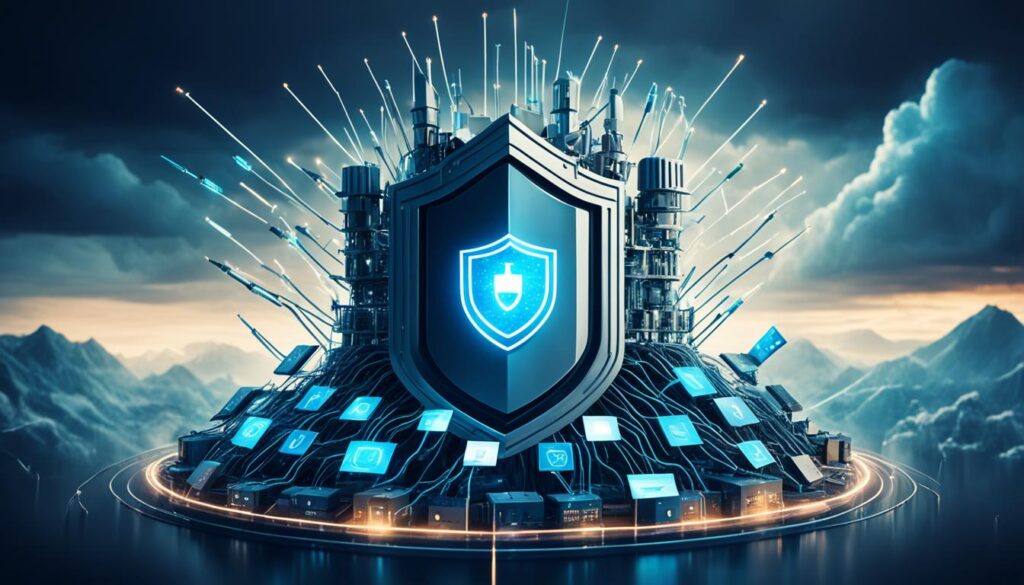In our modern era, businesses heavily depend on digital tools. This makes it vital to discuss the importance of cyber security. With cyber threats growing in complexity and frequency, keeping data safe and preventing attacks is a top concern. This is true for all types of companies. But, exactly why is cyber security so critical? And what benefits come from strong security steps?
Cyber security is more than data protection. It’s about saving your business from losing money and trust. A single breach can lead to big financial losses and harm your reputation. Also, relying more on digital tech means facing many risks. These can stop a business from running smoothly.
So, how can companies protect themselves from digital threats that keep changing? The solution is to understand all the good things cyber security brings. And use many layers of security. This includes more than just antivirus programs.
Key Takeaways:
- Cyber security is of utmost importance in today’s digital landscape.
- Data breaches can lead to financial and reputational damage.
- Businesses must protect themselves from evolving threats.
- Comprehensive cyber security measures go beyond antivirus software.
- Implementing robust security measures is crucial for the survival and success of any organization.
The Growing Dependency on Digital Solutions and Its Risks
In today’s world, we rely heavily on digital technology for both personal and work tasks. This includes everything from online banking to IoT gadgets. Yet, depending so much on these solutions also leads to new risks we must face.
Our use of digital tools makes us more vulnerable to cyber threats. The more we connect online, the more chances hackers get to attack. They look for ways to break into systems and steal our data.
These threats don’t just affect individuals. They can cause businesses and even whole countries significant harm. Financial losses, damage to a company’s reputation, and attacks on vital systems are just some dangers. This is why all organizations, big or small, need to take cybersecurity seriously.
To lessen these digital risks, we need solid cybersecurity in place. This means using strong encryption and keeping our software updated. Plus, everyone must know how to stay safe online. Having a plan to deal with threats when they come is also crucial.
| Key Risks of Digital Dependence | Key Measures to Mitigate Cybersecurity Risks |
|---|---|
|
|
By understanding and actively working against these digital threats, we can protect our online world better. Staying alert, improving how we handle cybersecurity, and knowing about new threats are key. This way, we keep our digital lives safe.
Importance of Cyber Security in Protecting Against Modern Threats
Nowadays, businesses lean more on digital tools. This makes cyber security critical. With many threats out there, protecting data and reputation is key. It’s vital to put strong cyber security in place to ward off these risks.
Consequences of Data Breaches in Business
When a data breach happens, businesses can be hit hard. The financial and operational impacts are significant. If customer data gets out, trust is lost, and the company’s image suffers. This can lead to lost sales and a bad brand image.
Moreover, breaches can cause business problems and downtime. This lost time means lost money and productivity, especially if key systems are down.
The Financial Implications of Cyber Attacks
Cyber attacks’ costs can be huge. Think about the money spent on investigations, notifications, and prevention. These expenses burden businesses, especially smaller ones. There’s also the threat of losing important business secrets and intellectual property.
This loss of key information can hurt a business long-term. Fighting to recover and keep a good market place is tough.

| Business Impact of Data Breaches | Financial Impact of Cyber Attacks |
|---|---|
|
|
Defining Cyber Security: A Shield Against Digital Threats
Cyber security focuses on protecting our digital world. It keeps computer systems and data safe from people who shouldn’t access them. This field uses many technologies and methods to ensure information stays private and digital assets are secure.
In today’s world, we depend a lot on digital devices and the internet. Cyber security is very important because cyber attacks happen more often and are getting smarter. This means we need strong security to keep up with new threats.
Cyber security uses various strategies to guard against online threats. Here are some key areas it covers:
- Network Security: This keeps the network safe from hackers and data leaks. It uses tools like firewalls and VPNs to keep out unwanted visitors.
- Application Security: It shields software programs from being hacked. By using secure coding and updating software regularly, vulnerabilities are minimized.
- Data Security: Data security involves keeping important information safe. It uses encryption and access controls to protect data, alongside backup strategies in case of emergencies.
- Identity and Access Management: It controls who can access what. This includes login requirements and setting permissions to make sure only the right people can see sensitive information.
- Incident Response: This is a plan for when things go wrong. It includes quickly spotting threats and responding to minimize their impact, as well as measures to prevent future problems.
Cyber security is essential for keeping everything from personal devices to national security safe. It helps prevent data leaks, financial hits, and keeps our trust in digital systems strong.
Comprehensive Cyber Security: More Than Just Antivirus
Cyber security has grown a lot in recent years. It’s not just about antivirus anymore. Today, companies must use many different tools and methods to stay safe online. This broad approach helps deal with the many threats out there.
Emergence of Multi-Faceted Cyber Security Measures
Only using antivirus is not enough now. Cyber threats are more complex. So, companies are looking at many ways to stay secure. They use layers of defense with different tech and strategies. This way, they tackle threats from all sides.
The Role of Cyber Security in Regulatory Compliance
Cyber security is key to following the law and keeping data safe. Government rules are getting tougher because more attacks are happening. So, companies have to keep up to protect their data and systems.
By taking cyber security seriously, companies not only protect against threats. They also avoid fines and damage to their reputation. This is done by meeting the strict rules set by governments worldwide.
| Compliance Requirement | Description |
|---|---|
| Data Protection Regulations | Organizations must establish robust data protection policies and procedures to safeguard personal information and ensure compliance with applicable data protection laws. |
| Industry-specific Compliance Standards | Certain industries, such as healthcare and finance, have specific regulatory requirements for protecting sensitive data. Cyber security measures must align with these industry-specific compliance standards. |
| International Data Transfer Regulations | Organizations that operate across borders must comply with international data transfer regulations, such as the General Data Protection Regulation (GDPR), when transferring data across jurisdictions. |
Good cyber security helps companies follow laws and protect against cyber crimes. It makes their online safety strong and reliable.
The Scale of Cyber Security Threats Worldwide
In our world today, cyber security threats have grown bigger than ever. All kinds of organizations, big or small, face attacks from those who want to find weaknesses in their systems.
Cyber attacks are more common and smarter, hitting not just big companies but also small ones, and even governments. To keep up, we must act ahead to keep our data safe and stop chaos.
The quick rise of digital life and new tech is a main cause of these threats. Cloud computing, the Internet of Things (IoT), and mobile gadgets make it easier for bad actors to get in.
Also, worldwide networks and the move to digital for essential services make many more targets. With the world relying more on digital ways, harmful cyber attacks can happen anywhere. Everyone is at risk.
Cyber attacks can cause huge harm, like losing money, damaging a company’s or person’s reputation, or leaking private data. It can cost a lot to fix these issues, sometimes millions of dollars.
To fight cyber attacks, groups should do many things. They need to have strong security, teach their workers about online risks, and always update their tech. They should also work with trusted cyber security experts.
By being alert and ready against online threats, organizations protect their digital properties from the world’s cyber dangers.
| Impact of Global Cyber Security Threats | Preventive Measures |
|---|---|
|
|
How Cyber Security Measures Protect Your Organization
In our digital age, cyber threats are a big risk for businesses. It’s crucial to have strong cyber security. These measures protect important data and stop hackers.
This section looks at different ways organizations can boost their cyber defenses.
Application and Network Security Mechanisms
Application security keeps software safe from hackers. Secure coding and updating software often are key. Also, regular checks for weaknesses help keep data safe.
Network security works to keep out unauthorized users and malware. It involves using tools like firewalls and VPNs. These protect data as it’s sent, making sure only the right people see it.

Identity Management and Data Security Policies
Identity management stops unauthorized people from getting to important data. It uses strong passwords, extra checks like fingerprint scanning, and smart cards. This ensures only the right folks can see important info.
Data security policies are rules on how to handle and protect data. They cover things like encryption and backing up data often. Following these policies helps avoid data leaks and keeps personal information safe.
Comparison of Cyber Security Mechanisms
| Security Mechanism | Key Features | Benefits |
|---|---|---|
| Application Security | Secure coding practices, software updates, vulnerability assessments | Protects against application vulnerabilities and unauthorized access |
| Network Security | Firewalls, intrusion detection systems, virtual private networks | Secures network infrastructure and data transmissions |
| Identity Management | Password policies, multi-factor authentication, biometric technologies | Prevents unauthorized access to sensitive information |
| Data Security Policies | Encryption methods, data classification, regular data backups | Ensures privacy and confidentiality of personal data |
To fight cyber threats, it’s best to use many security tools together. And, it’s important to update these measures often. This keeps up with new threats and protects valuable data.
The State of Cyber Security in the Philippines
In the Philippines, both big and small companies are worried about cyber security. Small and medium businesses (SMEs) face unique problems. They must protect their digital info from online threats. It’s important to know the current cyber security situation in the Philippines. This knowledge helps in setting up strong protection.
Challenges for SMEs in the Digital Landscape
The Philippines’ economy counts on SMEs for jobs and growth. Yet, SMEs struggle more with cyber threats because they have fewer resources. They don’t often have IT teams to solely focus on security. And as the digital world grows, new dangers and challenges pop up.
Many SMEs don’t know enough about keeping their digital info safe. They lack the info and tools to fight off cyber attacks well. This makes them a target for various online threats, such as phishing and ransomware. They’re also at risk for data leaks.
Examples of Cyber Security Measures in Filipino Companies
Despite facing difficulties, some companies in the Philippines do well in cyber security. They set good examples for their peers. They use a mix of strategies to keep their digital info safe.
By focusing on cyber security, Filipino companies can better protect themselves online. They must keep learning about new threats and how to fight them. This way, they can ensure their online systems and digital info are safe.
It’s crucial for SMEs in the Philippines to address their cyber security challenges. With the digital world always growing, they must put good security plans in place. This protects their important data and helps their businesses grow safely.
Global Influence on Local Cyber Security Strategies
Today, digital connections mean the world’s approach to cyber security matters everywhere. Cyber threats go beyond borders. So, fighting them needs everyone to work together. International standards are key for every country’s cyber safety plan.
Countries use these global guidelines to make their own strong cyber protections. They share lessons to get better, learning from both wins and mistakes. This builds a world where everyone’s cyber security improves together.

Global standards set the bar for cyber safety, guiding areas like risk and how to respond to attacks. Following these helps build strong defenses for both organizations and nations.
Working together globally is crucial for cyber safety. It means tackling new threats as one team and creating smarter defenses. This teamwork also helps in fighting off cyber-attacks more effectively.
Having the same global rules means everyone stays on top of security in the same way. This stops hackers from using weak spots left by different rules around the world.
The fight against cyber threats keeps changing. So, the world keeps updating its rules to stay ahead. This way, everyone’s defenses get better against new dangers.
| Key Elements of International Cyber Security Standards | Benefits of Global Collaboration |
|---|---|
|
|
Focusing on these global cyber standards helps countries build tougher defenses. It encourages a worldwide plan for beating both present and future dangers.
Understanding global cyber safety is key for making our online world safer. It shows how working together protects our digital life.
Adopting Best Practices in Cyber Security for Small Businesses
Cyber Security Training for Staff
Small businesses need to make sure their staff knows the risks and the best ways to keep data safe. Training employees in cyber security is key. It helps them to spot and react to dangers. This builds a culture of being alert about cyber threats.
Employees need to learn about several cyber topics, including:
- Recognizing common cyber threats such as phishing emails, malware, and social engineering attacks.
- Creating strong and unique passwords to prevent unauthorized access.
- Understanding the importance of regularly updating software and devices to maintain security.
- Implementing safe browsing practices to avoid visiting malicious websites or downloading harmful content.
- Using encryption techniques to safeguard sensitive data during transmission and storage.
By educating staff and keeping them up-to-date on cyber security, businesses can lower the risk of attacks.
Implementing Data Protection Strategies
Small businesses also need strong data protection methods to keep info safe. These include steps to ensure data is private, reliable, and available.
Important data protection strategies are:
- Regularly backing up data to secure offsite locations.
- Implementing access controls and user permissions to limit unauthorized access to sensitive information.
- Using firewalls and intrusion detection systems to monitor and protect the network.
- Encrypting data to prevent unauthorized access in case of a breach.
- Conducting regular security audits and vulnerability assessments to identify and address any potential weaknesses.
By putting these data protection methods in place, small businesses can improve their cyber security and be more prepared for threats.
Understanding the Comprehensive Benefits of Cyber Security
Strong cyber security is key for businesses today. It brings many benefits like trust, a better name, and stopping money loss.
Cyber security boosts trust between businesses and their customers. As data breaches soar, people are wary of sharing online. Good cyber security makes customers feel safe.
It also helps businesses look better. Showing you protect data earns a good name. People spread the word, attracting new customers and partners.
It’s also a big shield against losing money. Cyber attacks can be costly, from lost data to lawsuits. Guarding against these saves a lot of trouble.
Finally, it helps with following the law. Many sectors have special rules on data. Good cyber security means not breaking these laws and avoiding fines.
So, investing in cyber security is vital. It does more than stop attacks. It builds trust, keeps your name good, and stops money woes. For any business, it’s a must.

| Benefits of Cyber Security | Business Advantages | Cyber Security ROI |
|---|---|---|
| Increased trust | Improved reputation | Protection against financial losses |
| Data protection compliance | Operational continuity | Cost savings |
| Legal liabilities reduction | Customer loyalty | Competitive edge |
Conclusion
The importance of cyber security is clear today. The use of digital tools brings many risks. These dangers can hurt businesses, especially small ones.
We talked about how data breaches and cyber attacks hurt companies. We learned that cyber security is more than just antivirus software. It involves many steps and helps with following rules.
We also saw that cyber threats are a global issue. Knowing about them helps companies protect themselves. This knowledge is key in making good security plans.
To wrap up, cyber security is vital for any business. It needs action and care. By focusing on it, companies can keep their data safe and their reputation strong.
